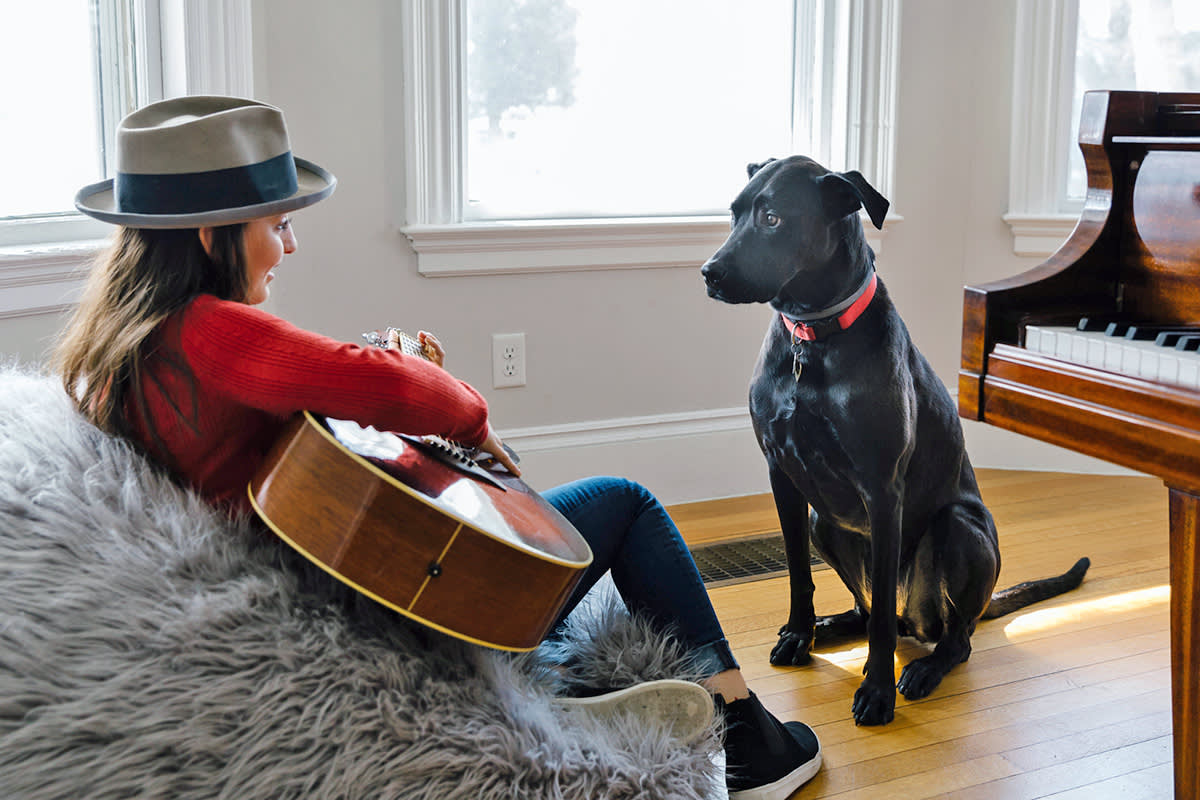Does Your Pet Like When You Sing to Them?
You do have some pretty great songs.

Share Article
So, you’ve written the perfect song to honor your pet. You’ve found every word that rhymes with “Fluffy,” workshopped the bridge, and sounded out a catchy tune to tie it all together. But do our pets really appreciate when we sing to them, or do these little songs we make up fall into the “more for us than for them” column of pet care?
It’s worth asking. After all, TikTok is full of videosopens in new tab of people serenading their dogs. Remember the trendingopens in new tab “Good Morning to the Cutie Pie” song? It had commenters wondering if their pups and cats would actually like to hear a daily morning song (or a song about anything). Well, this adorable Maltipoo seems pretty into opens in new tab her mom’s cover of “I Will Always Love You.” And this cat opens in new tab seems interested, but maybe it’s because her mom is singing Billie Eilish’s Barbie ballad in meows, in lieu of English.
If you’re convinced your dog pricks their ears up in excited anticipation when you sing or that your cat seems calmer when they hear that special tune, you might be right. Although the research on pets and singing is spotty, the information we do have indicates that our familiars do, at least, seem to appreciate a certain kind of music. If anything, we might want to tweak our original songs (or covers) to better suit their tastes. Here’s what science says (and what it doesn’t) about how pets process our personalized power ballads.
Do dogs like it when you sing to them?
Let’s start with pups. Do they actually like to hear our melodic voices, or do they just put up with it? There really is no way to tell definitively, unfortunately. When it comes to dogs, Zachary Silver, professor of psychology and director of the Canine Intelligence Labopens in new tab at Occidental College, says, “We’re not quite sure if they like the melodies or the harmonies that go into music.” That said, he points out, we know that dogs respond positively when we use our special “pet voice.��”

We all have it — that higher-pitched tone we use exclusively with our special animals. Singing shares a lot of properties with dog-directed speech, Silver says. “So, while we don’t know for sure if dogs like melodies and the [musical] properties that we think about, certainly they are more likely to pay attention to a human singing than they are to a human just speaking normally.” Do they care for it? Who knows? But they hear you, that’s for sure.
Do cats like it when you sing to them?
Although there isn’t much research examining how cats feel about their parents singing, there is reason to believe that they can recognize when their parents are speaking to them.
A 2022 study opens in new tab found thatopens in new tab cats responded distinctly to the sound of their parents using cat-directed speech. They did not respond when their parents used adult-directed speech (in other words, when they used the voice they normally use when speaking with fellow human adults) or to strangers, regardless of which voice they used. The study also found that cats respond better to a baby voice, specifically. So, when you say, “Hey, buddy, come get your dinner” in your cutesy voice, they pay attention.
That said, Silver notes that evolutionarily, cats never had the same incentive to form working relationships with human communities the way that dogs did — so cats are generally thought to pay less attention to human activities than dogs do. “Dogs are significantly more likely to engage with human speech than cats,” Silver says. “So, I think it is plausible that dogs also are more likely to have a preference toward music than cats.”
Once again, however, Silver cautions that that idea is mere conjecture based on what we know about animals’ relationships with speech. “To really answer that question fully, we would need to do experiments that we deliberately look at dogs and cats responding to singing, in particular.” But for now, here’s the takeaway: If your furry mob boss responds to your singing, they may just be responding to a vocalization that sounds like the baby voice you do. In other words, they may tune in because they think you’re going to feed or do something else that will please them immeasurably.
Do dogs like music?
OK, so we’ve gone over whether your dog likes the music you make (still up for debate), but do they like music in general? Silver notes that most rigorous, empirical research on canine cognition began only 25 to 30 years ago. Because of this, our science-based understanding of dogs’ inner workings is limited. But while the Beethovens of the dog world might be better known for their drool than for their dazzling compositions, studies do seem to indicate that your little genius can appreciate a good concerto.
Research suggestsopens in new tab that dogs have a sense of pitch and may behave differently when listening to one genre of music versus another. One 2012 studyopens in new tab, for instance, found that classical music seemed to calm shelter dogs more than pop or heavy metal based on physiological factors, like heart rate and cortisol levels found in saliva. Fascinatingly, however, audiobooks performed even better — so while your dog might prefer Chopin to Chappell Roan, War and Peace could be an even better choice of background noise to play at home while you run errands. Even more interesting, a more recent studyopens in new tab found that reggae and soft rock produced more profound effects than classical music and that rotating between genres helped boost results as well.
Why do dogs like music?
Silver offers a couple possible reasons for dogs’ music appreciation. Dogs might be fascinated by music like any unfamiliar sound, and it’s also possible that they’ve grown more attuned to it across generations as a way to bond with humans.
“Anecdotally, I’ve had a lot of people tell me that their dogs really enjoy when they play music on an instrument,” Silver says. “I think that part of this could be a novelty effect. It’s just something that they’re not used to hearing.”
One could also argue that dogs have evolved over time to be more responsive to music based on its implications for their survival. Silver points out that historically, the dogs who socialized best with humans would have been the most likely to continue breeding over time. Perhaps, he suggests, some dogs realized that humans who were engaged in making or enjoying music were more likely to share food and form social bonds.
“Unfortunately, we just don’t have great, concrete answers to that,” Silver says. “So, all we can rely on right now is the accumulation of individual anecdotes.”
Why do dogs howl at music?
We know that dogs howl to communicate. Whether your dog likes to “sing” along to music or wail at passing ambulances, they are trying to tell someone… something. Some breeds howl more than others, and the motivation behind the moaning can vary from expressing pain or fear, to joining a chorus, to crying out for attention. Whatever your dog is howling at, the simplest answer behind the “why” is that they were simply programmed to do it.
Do cats like music?
In news that will likely surprise exactly no one, research suggests that cats might be pickier than dogs. A 2019 study publishedopens in new tab in the Journal of Feline Medicine and Surgery found that while music composed specifically for cats successfully calmed subjects in a veterinary clinic setting, classical music failed to produce the same effect. In 2015, however, a separate experimentopens in new tab published in the same journal found that classical music successfully calmed cats during surgery, outperforming both pop and heavy metal (surprise, surprise).
Taken together, these studies suggest that music can positively impact cats’ moods. That said, both experiments were relatively small — the first examined 20 subjects, while the second included only 12 — so more robust research could scratch further below the surface.
So, what should you do? Keep singing to your pets? Definitely. Keep playing them music when you leave the house? If that’s your routine, why not? It’s not like they’re running away screaming (or maybe they are). But if they don’t like it, they can leave the room. After all, they are more like us than wild animals these daysopens in new tab.
References
Crawford, Amy. “Why Dogs Are More like Humans than Wolves.” Smithsonian Magazine, www.smithsonianmag.com/innovation/why-dogs-are-more-like-humans-than-wolves-22095590/opens in new tab.
“Do Dogs Have a Musical Sense?” Psychology Today, www.psychologytoday.com/us/blog/canine-corner/201204/do-dogs-have-musical-sense.
Lewis, Tanya. “Your Cats Can Tell When You’re Speaking to Them.” Scientific American, www.scientificamerican.com/article/your-cats-can-tell-when-youre-speaking-to-them/opens in new tab.
Stout, David. “Science Has Found out What Music Your Cat Should Be Chilling to While Being Neutered.” TIME, Time, 31 Mar. 2015, time.com/3764866/cats-surgery-classical-music/opens in new tab. Accessed 11 Feb. 2025.

Laura Bradley
Laura is a New York-based experienced writer and mom of two rescue pups. Her work has appeared in Slate, Vanity Fair, Daily Beast, The Washington Post, The Atlantic, Yahoo! News, Vulture, Grazia Magazine, and more. When she is not writing or walking the pooches, you will probably find her in the community garden.
Related articles
![Dog listening to music on headphones and licking nose]()
Pet-Specific Playlists on Music Streaming Services Are a Thing. Do Cats and Dogs Like Them?
Research says, just like us, animals love a good jam.
![Short-haired blonde woman in a tan sweater and blue jeans sitting on a bench talking to her Beagle mix dog who is looking up at her]()
How You Say Something to Your Dog Matters More Than What You Say
TikTok pet parents have made this clear: Tone matters. Celebrity dog trainer Nicole Ellis says dogs can hear “stress in our voice — whether directed at them or when they hear us talking to others.”
![Puppy with one ear up an done ear down.]()
15 Amazing Facts About Dog Ears
There’s a lot more to your pup’s furry appendages than you might think.
![Woman sitting on couch with dog laying on lap watching TV]()
What Dogs See When They Watch TV
Is Animal Planet really their favorite channel?
![Reflection of a multi-colored rainbow on the face of a mixed breed dog sitting on the floor indoors]()
What Colors Can Dogs See? How Dog Vision Really Works
Let’s put a stop to this “dogs are totally color blind” myth.
What Do Puppy Sounds Mean?
Besides being ridiculously cute.








